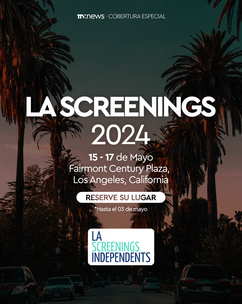The fourth day of the TTV Media event featured Disney+ and its arrival in Latin America, and Turkish distributors and their plans for 2021.
This Friday, December 11, TTV+Live: The Future of TV Content completed its first week with two panels focused on the future of content and consumer habits in Latin America from two different perspectives: the launch of Disney+ in the region and the evolution of the Turkish phenomenon in LatAm.
From the Disney+ side, the protagonists were Natalia Scalia, Head of Direct-to-Consumer, The Walt Disney Company Latam; and Fernando Barbosa, General Manager Media Networks, The Walt Disney Company Latam (US).
More than a year after its launch in the US in November 2019, the platform’s arrival in Latin America was driven by months of anticipation and expectation from both the company and local audiences.
“I think it goes without saying that there was a lot of excitement and enthusiasm here in Latin America,” Scalia began. “I think it is a unique moment, with a very strong convergence in a product that brings together our company’s best content in one place: Disney, Pixar, Marvel, Star Wars and Nat Geo, plus local content, original releases and upcoming launches. It is an offer of the highest value, which occupies a unique space in our industry.”
One must simply look at the very high budgets for original production to verify the value of this offer, with numbers that exceed billions. “We are doubling annual production budgets, going from 4 billion dollars to 9 billion,” said Barbosa.
“More than 100 fresh, high-quality titles were announced. Between Marvel, Star Wars and Disney, 35 new series were announced, including Pixar series which is historic because it is the first time that Pixar makes series, in addition to feature films that will be released directly on the Disney+ platform”.
In addition to the magnanimous offer that these five brands comprise, Disney+’s differential in Latin America, the executives explained, will be its local offer.
“It is a global product but with a very strong local footprint. We have had a very strong eye on what local content is, as well as global content and its pedigree,” Scalia said.
“Local content is necessary for the relevance and success of how we are going to relate to the Latin American consumer. We want the public to connect with global brands, but also with the local voices of each market, as Disney has been doing. more than 20 years, investing in local content”.
“Regarding local content, not only in Latin America but in each region, will have endless local productions for Disney+,” Barbosa added. “In our case, they are destined for the Spanish-speaking continent but they will be seen all over the world. Each region will contribute a huge number of local production and Latin America is the most active region outside the US.”
“Thus, for Disney+, we will inject about 60 or 70 local productions in the next two years. We are going to generate a volume that we had never generated before,” he summarized, also highlighting the launch in June of a general entertainment platform called Star+, which will also have local production.
With so much emphasis put on Disney+ and the direct-to-consumer business, the company’s strategy will evolve in terms of distribution and relationships with third parties. “The strategy has completely changed. The main objective now is to feed our own direct-to-consumer services, over any other content distribution to third parties,” explained Barbosa.
“However,” he clarified, “it does not mean that content distribution is completely dead. We know that in Latin America there is a robust broadcast TV platform and that the socio-economic demographic profile of the key audience in broadcast TV is different than in pay TV and SVOD. We also know that there is little risk of cannibalization in terms of the distribution of content to broadcast TV. ”
“So the distribution to third parties on broadcast TV will continue, but it will be in a studied and careful way.”
Lastly, executives spoke about how 2020 and the new consumer habits affected by the pandemic shaped the launch and premiere strategy for Disney+. “We had an important advantage, which was that the launch of Disney+ in LatAm coincided with the premiere of the second season of The Mandalorian, so we made the full first season already available,” said Scalia.
“Also, we premiered Mulán on December 4. We also have weekly premieres of original series like High School Musical, The Series, and more than 40 original content that has never been seen in the region. And we realize that consumers continue to discover these new titles.”
“Regarding what’s to come, we are close to the premiere of Soul on December 25, a highly anticipated film that started out as a theatrical release but will now premiere directly on the platform. Then we have the WandaVision premiere on December 15. January, the first Marvel series developed directly for Disney +, with weekly premieres; and Falcon and the Winter Soldier for March. In total, in the near future, another 10 Marvel series were announced that are already in production for the platform”, she concluded.
The full panel can be viewed here: https://ttv.live/ttvplus/en/virtual/stage/41946
Regarding Turkey, the panel included Beatriz Cea Okan, VP and Head of Sales and Acquisitions, Inter Medya; Mikaela Perez, Sales Manager, Kanal D; and Iván Sánchez, Sales Director Latam, Global Agency, who reviewed the changes that Turkish content has undergone since its arrival in Latin America and anticipated how they believe the phenomenon will evolve in the coming years.
In that sense, the executives said that, since their arrival in 2014 through Mega in Chile, the first big change they saw was in the schedules.
“At the beginning, most of the products were for prime time, but as time went by we began to see that the channels were willing to look for other types of content that were better adapted to the afternoon or even morning hours,” Iván Sánchez recalled.
The second big change has been new opportunities found in new genres, beyond classic dramas.
“After the popularity of Turkish dramas there has been a demand for other products, such as movies. And also for miniseries or shorter series, which we call the new generation of Turkish series and which we believe will be the next step in 2021”, highlighted Beatriz Cea Okan.
“Short series are working very well in Turkey and can find a place in Latin America. They are stories that captivate and continue to be of great interest to the region. In our catalog we have a large number of short series that have worked very well for us and that we have managed to license platforms in Latin America,” added Mikaela Perez.
And finally, the next big leap has been to platforms.
“Now we see that we are not only reaching broadcast TV but also other platforms such as pay TV and OTT,” Sánchez said.
Now, the next big challenge seems to be to finally finalize the first co-productions, a task that is proving not to be easy and that has been even more complicated due to the pandemic.
“We already have an advanced project between Turkey and Spain with Plano a Plano. We are already partnering with other international companies. Turkey is a country with many cultures and this means that very beautiful and multicultural stories can be created. I think there is great potential for create projects with Latin America and other regions “, commented Beatriz Cea Okan.
Mikaela Pérez and Iván Sánchez, on the other hand, were less optimistic.
“This year and next year, they may not be the best to go into co-production. Although success has been evident in the region, we see that we would need a long time to achieve a co-production. The main problem is logistics, but we also have many things going for it… I think this is a time of creation, of looking for new projects, evaluating them and taking them into account for the future,” said the Kanal D executive.
“We are only dedicated to distribution, right now we are not involved in production. But it is true that we are in contact with producers in Turkey and among our clients in Latin America there were always very good intentions and desire to collaborate between both regions. You win there are many, but the formula is not so easy. Finding the formula to mix all that is complicated,” he completed.
The full panel can be viewed here: https://ttv.live/ttvplus/en/virtual/stage/41947
TTV+ Live: The Future of TV Content, is taking place within the TTV+ platform for 10 days with more than 20 panels, keynotes and conferences by more than 40 renowned speakers from the TV industry.
Among them, names such as Kate del Castillo, Juan José Campanella, Natalia Scalia, Fernando Barbosa, Sonia Martínez, Maarten Meijs, Javier Pons, Carlos Bardasano, Fidela Navarro, Fredrik af Malmborg, Jimmy Arteaga and Ates Ince, among others.
The event runs until December 18.












